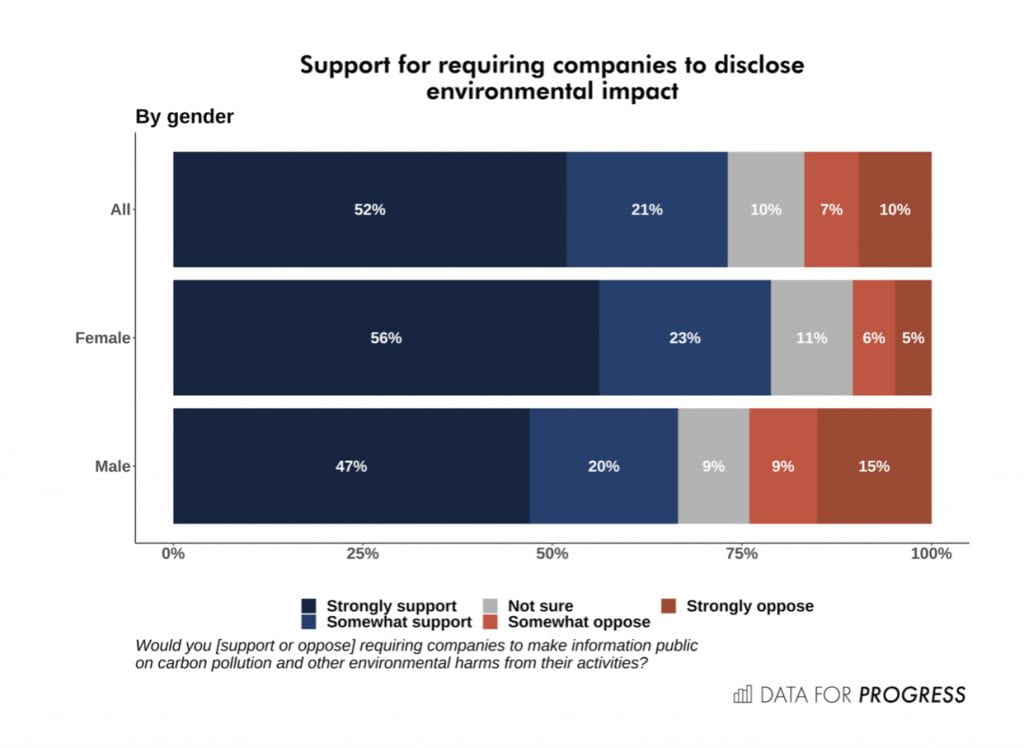Gender Equality and State Environmentalism by Kari Norgaard and Richard York analyzes the interconnectedness of women in political office and environmentalist policy. They suggest that with the rise of gender equality and the growing female role in the political world, there is more concern regarding ecological issues. They state that this connection is due to environmental degradation going hand in hand with women’s roles and their own degradation in daily life. The search for clean water and food sources place extreme demands on women in many parts of the world, causing great hardship and health issues. When more women come into the political realm and hold political office, allowing women to be on a more equal footing with men, those issues and policy changes become more of a focus, especially in making environmental policies that are to the benefit of women and their families.
“(Noorgard’s) research indicates that women are more likely than men to express support for environmental protection and that women consider a variety of environmental risks, from nuclear power to toxic substances, to be more serious than do men. “(A) now considerable body of ecofeminist theory asserts that sexism and environmental degradation are interconnected processes. This perspective holds that the values, ideologies, institutions, and economic systems that shape human-environmental relationships are themselves gendered and describes how these factors enable sexism and environmental degradation in mutually reinforcing ways (Merchant 1980; Seager 1993). This … ties both gender discrimination and environmental degradation to a common hierarchical social structure that simultaneously devalues both women and nature” (Noorgard p 508).
Our current Covid19 crisis should really be a wake up call. What we as a species are doing to our environment is literally killing people and all living things. Do we know how these viruses live in animals? Are we, by our actions through pollution and extreme pesticide and fungicide and chemical use creating these diseases that are then transmitted through animals? I don’t know the answers to these questions, but I do know that having 51% women in the political arena will most assuredly improve our chances of survival. Women are more inclined toward environmentalism and altruism from birth. They tend to have more empathy toward the down-trodden and choose to do more to help the disenfranchised. And, women, overall, have a greater affinity to working together as a community. (https://www.nature.com/articles/s41558-019-0448-2.pdf).
“Influential Women in Cleantech: Top 10 fighting for the Environment in our Governments” is a fascinating article about how women in top environmental positions are working toward green changes and are sometimes ostracized and criticized at every turn, but they persist and continue to strive for the good of all. For example, in 2012, Lisa P. Jackson was the EPA Administrator, also the first African American woman in that top position. She implemented programs for clean water, clean air, and toxic free living environments in communities as well as open lands. She has worked for Apple, The Clinton Foundation, President Obamas Administration, New Jersey EPA and many more to continue her good works to save the planet. (https://www.technicacommunications.com/cleantech/10-influential-women-in-cleantech-environmental-government-work/). They all see clearly the destructive path we are taking our only home, earth. From clean air, clean water, renewables and recycling and more, these women are at the forefront of innovation and rescuing the planet from ourselves.
In the research of Ramstetter and Habersack, the analysis of gender and environmental policy has several points. Firstly, socialization has a part to play in women and men approaching environmental issues differently. Women tend to learn and are innately compassionate, caring and nurturing, having concern for their fellow human and nonhuman. Men tend to learn how to be aggressive, seek power and not show emotion. These differing ways of seeing and behaving lead to differing ecological actions. Secondly, gender roles play a part. Women are concerned with family and nonhumans and environment where men care about career, money and prestige.
When looking at different countries and ‘elite’ legislators, the results were more ambiguous and inconsistent between women and men and also were dependent on particular countries. Sweden and the United States had more women making stricter environmental policies and often choosing it as their expertise. Still, Ramstetter states:
– Female representatives attach more importance to environmental issues than their male colleagues (attitudinal gender gap).
– Female representatives are more likely to support pro-environmental legislation than their male colleagues (behavioral gender gap).
The European Parliament (EP), considered of elite status, is 35% female and it consists of members from twenty seven countries. Three issues contribute to a more equitable share for women law makers in the EP:
- heralded as one of the most gender-equal elected bodies in the world
- women hold relatively powerful positions within committees and benefit from a more consensual style of politics that allows for ‘women’s cross-party coalitions and solidarity ties
- due to the EP’s institutional youth, masculine norms and behavior are less entrenched in its institutions and procedures than in most parliamentary settings, thus increasing women’s room for maneuver
Women EP members with a liberal ideology are much more inclined to support environmental issues, while conservative leanings, less so. Overall, however, …”(F)indings suggest that women are more likely to act for the environment, and thus more likely to represent women’s interests substantively. Our research provides evidence that ‘politics of presence’ have more than a symbolic function. Women in parliament make a substantial difference for women and for the environment” (Ramstetter).
dataforprogress.org in It’s no Dirty Secret: Voters Love Pollution Disclosure, show that women of all political ideology are more in favor of big business disclosing their pollution rates than men. Below is a diagram of female/male ratings:
Annotated Bibliography
Ramstetter, Lena and Habersack, Fabian. “Do we make a difference? Analyzing environmental attitudes and actions of Members of the European Parliament.” Environmental Politics Journal. May 2019.
An analysis of the elite MEP (Members of European Parliament) comparing women and men’s concerns and voting records for two specific years. Although a non-ambiguous result was not reached, women were significantly more inclined to vote for the environment and women’s issues than men.





The point you made about women having a greater affinity towards working in a group stuck out to me. I opened the link up to the source you provided from the Nature website (https://www.nature.com/articles/s41558-019-0448-2.pdf) and found it interesting. The source was saying that it’s important to have women in politics to help influence positive environmental change, but also said that working in those groups benefits the women as individuals. The website writes, “Participation in groups that are working towards a greater cause, such as climate change, contributes towards a sense of social support and solidarity.” This can have a positive domino effect, where women can see their female politicians caring about environmental issues, and they can be inspired to care. Then these women inspire their friends to care. It is just a matter of getting women in the position of power where they can have a platform to speak from.
Greetings Tari.
The statement of actions through pollution, extreme chemical and pesticide use created diseases, is food for thought; but the origins of viruses are ancient or unknown; but our destruction of the environment certainly predispose living beings to illnesses. Do female representation in parliament translate into better environmental protection? Spain ranks #16 for representation, but ranks #1for environmental representation; India ranks #70 from female representation and #31 for the environment; yet Rwanda ranks #1 globally for representation, and no ranking for the environment. So Ramstetter’s view of women in parliament making a difference for the environment must be from European women.
bridget.